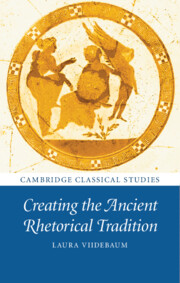
-
Select format
-
- Publisher:
- Cambridge University Press
- Publication date:
- 03 November 2021
- 18 November 2021
- ISBN:
- 9781108873956
- 9781108836562
- 9781108812580
- Creative Commons:
-
This content is Open Access and distributed under the terms of the Creative Commons Attribution licence CC-BY-NC-ND 4.0.
https://creativecommons.org/creativelicenses - Dimensions:
- (216 x 140 mm)
- Weight & Pages:
- 0.49kg, 292 Pages
- Dimensions:
- (216 x 140 mm)
- Weight & Pages:
- 0.37kg, 292 Pages
Open AccessYou have digital access to this book
Book description
This book explores the history of rhetorical thought and examines the gradual association of different aspects of rhetorical theory with two outstanding fourth-century BCE writers: Lysias and Isocrates. It highlights the parallel development of the rhetorical tradition that became understood, on the one hand, as a domain of style and persuasive speech, associated with the figure of Lysias, and, on the other, as a kind of philosophical enterprise which makes significant demands on moral and political education in antiquity, epitomized in the work of Isocrates. There are two pivotal moments in which the two rhetoricians were pitted against each other as representatives of different modes of cultural discourse: Athens in the fourth century BCE, as memorably portrayed in Plato's Phaedrus, and Rome in the first century BCE when Dionysius of Halicarnassus proposes to create from the united Lysianic and Isocratean rhetoric the foundation for the ancient rhetorical tradition. This title is available as Open Access on Cambridge Core.
Reviews
‘This book is a must-read for anyone wrestling with Plato’s relationship with rhetoric (a perennial vexation), anyone intrigued by Lysias’s unlikely tenacity (a minor feeling, perhaps), anyone longing for Isocrates to be taken seriously (a periodic desire), or anyone who has decided they can no longer put off reading more about Dionysius of Halicarnassus (an increasingly popular judgment).’
Michele Kennerly Source: Bryn Mawr Classical Review
Contents
Full book PDF-
Creating the Ancient Rhetorical Tradition
pp i-i -
-
- You have access
- Open access
- HTML
- Export citation
-
-
Cambridge Classical Studies - Series page
pp ii-ii -
-
- You have access
- Open access
- HTML
- Export citation
-
-
Creating the Ancient Rhetorical Tradition - Title page
pp iii-iii -
-
- You have access
- Open access
- HTML
- Export citation
-
-
Copyright page
pp iv-iv -
-
- You have access
- Open access
- HTML
- Export citation
-
-
Dedication
pp v-vi -
-
- You have access
- Open access
- HTML
- Export citation
-
-
Contents
pp vii-viii -
-
- You have access
- Open access
- HTML
- Export citation
-
-
Acknowledgements
pp ix-xi -
-
- You have access
- Open access
- HTML
- Export citation
-
-
Abbreviations
pp xii-xii -
-
- You have access
- Open access
- HTML
- Export citation
-
-
Introduction
pp 1-16 -
-
- You have access
- Open access
- HTML
- Export citation
-
-
Part I - Lysias, Isocrates and Plato: Ancient Rhetoric in Athens
pp 17-136 -
-
- You have access
- Open access
- HTML
- Export citation
-
-
1 - Lysias in Athens
pp 19-31 -
-
- You have access
- Open access
- HTML
- Export citation
-
-
2 - Reflections on Lysias and Lysianic Rhetoric in the Fourth Century BCE
pp 32-61 -
-
- You have access
- Open access
- HTML
- Export citation
-
-
3 - Isocrates and His Work on Rhetoric and Philosophy
pp 62-91 -
-
- You have access
- Open access
- HTML
- Export citation
-
-
4 - Isocrates on Socrates
pp 92-105 -
-
- You have access
- Open access
- HTML
- Export citation
-
-
5 - Contemporary Reflections on Isocrates and His Role in Rhetoric and Philosophy
pp 106-136 -
-
- You have access
- Open access
- HTML
- Export citation
-
-
Part II - Creating the Ancient Rhetorical Tradition: Dionysius of Halicarnassus in Rome
pp 137-244 -
-
- You have access
- Open access
- HTML
- Export citation
-
-
6 - From Athens to Rome
pp 139-175 - Lysias, Isocrates and the Transmission of Greek Rhetoric and Philosophy
-
-
- You have access
- Open access
- HTML
- Export citation
-
-
7 - Dionysius of Halicarnassus on Lysias, Rhetoric and Style
pp 176-213 -
-
- You have access
- Open access
- HTML
- Export citation
-
-
8 - Isocrates and Philosophy in Dionysius of Halicarnassus’ Rhetorical Writings
pp 214-244 -
-
- You have access
- Open access
- HTML
- Export citation
-
-
Bibliography
pp 245-270 -
-
- You have access
- Open access
- HTML
- Export citation
-
-
Index
pp 271-278 -
-
- You have access
- Open access
- HTML
- Export citation
-
Metrics
Altmetric attention score
Full text views
Full text views help Loading metrics...
Loading metrics...
* Views captured on Cambridge Core between #date#. This data will be updated every 24 hours.
Usage data cannot currently be displayed.
Accessibility standard: Unknown
Why this information is here
This section outlines the accessibility features of this content - including support for screen readers, full keyboard navigation and high-contrast display options. This may not be relevant for you.
Accessibility Information
Accessibility compliance for the HTML of this book is currently unknown and may be updated in the future.


